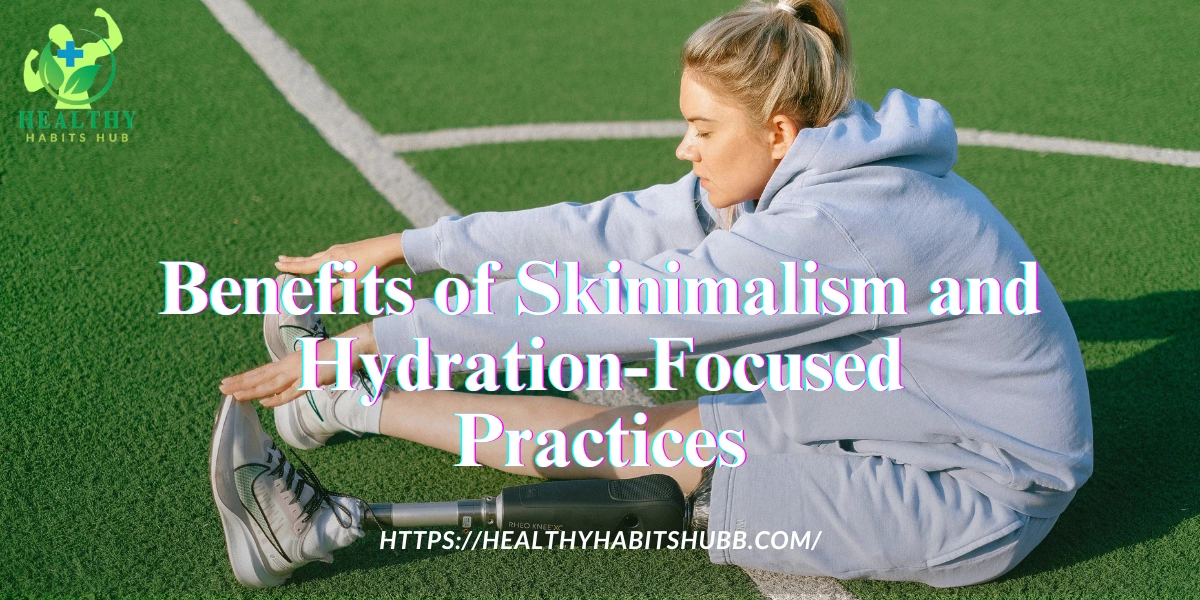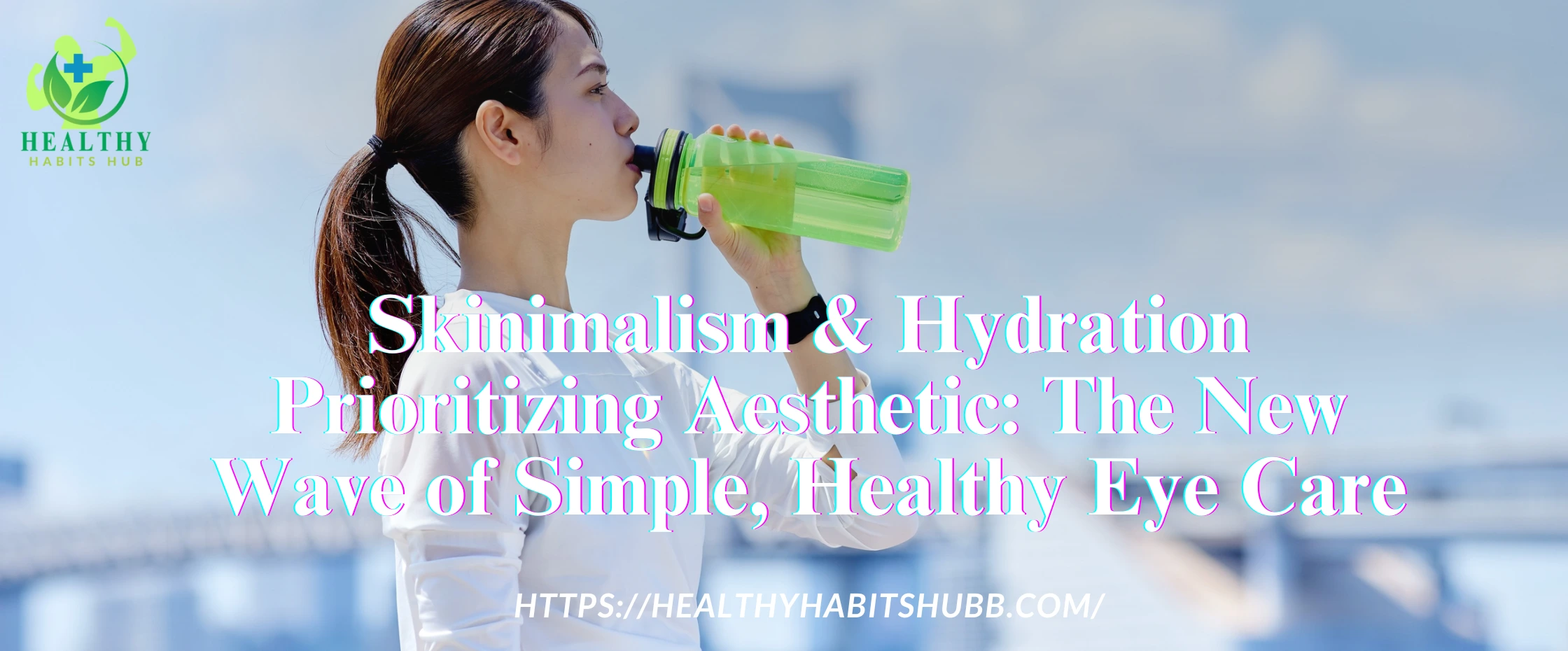Introduction
Table of Contents
ToggleLately, the beauty sphere has been undergoing a notable transformation toward minimalism as more people are adopting a skinimalist philosophy. Skinimalism represents accepting and enhancing natural beauty with the aid of fewer skincare products, which essentially improves its health and features without aggressively layering skincare routines. This phenomenon underscores a gently nurturing skin regimen coupled with a desire for scarcity, eco-friendly routines.
Alongside skinimalism, hydration-focused beauty has become a distinct skin aesthetic. To attain healthy and radiant skin, hydration importance cannot be overlooked, and products that enhance moisture levels have become central to many skincare regimes. In this blog, we will discuss skinimalism, hydration’s modern role, the merits of minimalism in beauty, and how adopting this trend will allow you to simplify and strengthen your skincare routine.
The Rise of Skinimalism

What is Skinimalism?
Skinimalism is a beauty trend that focuses on efficacy and ease with minimalism at the core of skincare routines. The philosophy is based on the less is more approach and promotes the use of products that are centered on skin protection and nourishment. It is the opposite of the “10-step skincare routine” popularized by Korean beauty trends which embraced an excessive amount of products and steps to address a singular skin issue.
It revolves the idea of blurring bare skin under make-up and aims to remove unnecessary products to achieve quality over quantity. In achieving the skinimalist ideal, the approach emphasizes basic skin care maintenance of moisturization, shielding, and healing with little complication towards the process. This trend prioritizes effectiveness and efficiency not just in results but in product application and time as well, which requires significantly reduced effort to achieve desired outcomes.
The Shift Towards Simplification
Excessive loading of skincare products onto the skin has led to the emerging phenomenon of skinimalism, which can also be attributed to the multi-functional nature of products. Skinimalism is characterized by the use of multi-functional products that serve more than one purpose and simplifies skincare routines, all while ensuring that no irritation or imbalances occur within the skin. With this, consumers tend to be more cautious with the ingredients in their skincare, opting for gentle, clean, and free-from harsh chemicals.
Mindfulness and sustainability are at the core of skinimalism as people become more aware of the excessive consumption and environmental impact caused by beauty products. A skincare routine that is aimed at simplification not only helps the skin but also minimizes waste and achieves a positive environmental impact, especially when coupled with fewer toxins and synthetic chemicals commonly found in the beauty industry.
Skinimalism and the Movement of Wellness
Skinimalism is also connected to the larger continuum of the wellness movement. As people prioritize self-care, mental health, and overall well-being, the beauty industry is shifting towards holistic skincare. Skinimalism promotes the idea that consumers should appreciate their skin, embrace flaws, and focus on a healthy, well-balanced lifestyle. The focus here is self-love and self-acceptance instead of masking and heavily altering one’s appearance with makeup, let alone complex routines.
The addition of simple, effective products allows people to establish a daily regimen which supports their wellness objectives. When skincare transforms into a simple, enjoyable ritual, it not only aids the skin, but also cultivates a sense of tranquility and mindfulness, which is crucial in today’s world.
Hydration-Driven Beauty: The Essence of Skinimalism

How Critical Hydration Is for Skin Health
The practice of skin hydration is critical to every skincare routine especially in the era of skinimalism. Hydration restores skin suppleness and smoothness while also making skin appear radiant. Dehydrated skin, on the other hand, is flaky, dull, and more susceptible to aging. Proper hydration also helps sustain the skin’s natural barrier and bioprotective mechanisms, as well as the skin’s resilience to damage and self-repair.
Water is essential for the skin’s overall function. Enhanced hydration results in optimal functioning of the skin which translates into overall health and wellness. In fact, hydration is often considered the most important aspect when it comes to maintaining youthful and glowing skin. With skinimalism promoting simplification in skincare routines, emphasis on hydration has become a popular theme.
Essential Hydrating Components in Skin Care Products
There are several components known for their ability to intensely hydrate and help retain moisture within the skin. These components have become staples in skinimalist routines as intense hydration is delivered without excess additives that overwhelm the skin.
- Hyaluronic Acid: Known for its ability to retain up to 1,000 times its weight in water, hyaluronic acid is a superstar in hydration-focused skincare. It is an excellent humectant that draws moisture into the skin, making it feel plump and nourished. Hyaluronic acid is usually incorporated into serums and moisturizers, as well as masks. It is suitable for use by all skin types.
- Glycerin: Another humectant is glycerin which draws moisture from the atmosphere and to the skin, helping the skin retain water. It is gentle to skin and is commonly used in toners, moisturizers, and cleansers.
- Ceramides: This lipid molecule works with the skin’s lipid layer to maintain skin barriers and protect the skin from irritants as well as moisture loss. Ceramides can be found in moisturizers and in barrier repair products.
- Aloe Vera: Aloe vera is well-known for its rejuvenating and soothing qualities, and its use in gels, creams, and facial masks helps in calming irritated skin while providing hydration.
- Squalane: A lightweight oil that can be derived from sugarcane and olives, squalane helps retain moisture, keeping skin soft and well hydrated without greasiness.
- Niacinamide: Known as Vitamin B3, niacinamide promotes hydration while simultaneously reinforcing the skin’s protective barrier. As an anti-inflammatory, it is beneficial for sensitive skin.
Skincare Products with Focused Hydration
In skinimalism, hydrating products serve multiple purposes. They provide moisture in addition to barrier repair, anti-aging effects, or calming properties. Below are some hydration-focused skinimalist products:
- Hydrating Serum:
Moderately heavy, these serums contain potent active ingredients like hyaluronic acid which can severely refresh tired skin. They are best applied under moisturizers to ensure maximum hydration without overloading the skin.
How Does a Hydrating Serum Work?

Hydrating serums work by providing the skin with deep moisture and nourishment. They contain humectants, which are substances that help to draw moisture from the environment into the skin. These serums are formulated with ingredients that have a high capacity to hold water molecules, ensuring that your skin stays hydrated throughout the day.
Some of the key ingredients in hydrating serums that contribute to their effectiveness include:
- Hyaluronic Acid: One of the most popular ingredients in hydrating serums, hyaluronic acid is a powerful humectant that can hold up to 1,000 times its weight in water. It draws moisture into the skin and helps retain it, keeping the skin plump, hydrated, and smooth. Hyaluronic acid is often used in serums for its ability to deeply hydrate without clogging pores, making it ideal for all skin types.
- Glycerin: Like hyaluronic acid, glycerin is a humectant that helps the skin absorb and retain moisture. It works by attracting water from the environment and pulling it into the skin, which helps keep the skin hydrated and soft.
- Aloe Vera: Known for its soothing properties, aloe vera helps hydrate and calm the skin. It contains enzymes, antioxidants, and vitamins that support the skin’s natural moisture balance.
- Vitamin C: While primarily known for its brightening and anti-aging effects, vitamin C also plays a role in skin hydration. It helps to repair and strengthen the skin’s moisture barrier, improving the skin’s overall hydration.
- Peptides: Peptides are short chains of amino acids that support the skin’s natural barrier function. By improving the skin’s ability to retain moisture, peptides help keep the skin hydrated and resilient.
- Moisturizers with SPF: These multitasking products are both moisturizers and hydrators with SPF, melding two essential steps in one. Protection from UV rays is vital for skin health, as they can hasten dehydration and damage skin.
How Moisturizers with SPF Work
A moisturizer with SPF works by combining the hydrating benefits of a regular moisturizer with the protective qualities of sunscreen. These products are designed to provide daily hydration while ensuring that the skin is shielded from the damaging effects of UV radiation.
- Hydration
Like regular moisturizers, moisturizers with SPF contain ingredients such as glycerin, hyaluronic acid, and ceramides, which help to maintain moisture in the skin, preventing dryness and flakiness. They are formulated to replenish the skin’s natural moisture barrier, keeping it soft, smooth, and hydrated throughout the day. - Sun Protection
Moisturizers with SPF are formulated with sunscreen agents that protect the skin from harmful UV rays. These can be either chemical (organic) sunscreens or physical (mineral) sunscreens:
- Chemical sunscreens absorb UV rays and convert them into heat, which is then released from the skin. Ingredients like avobenzone, octinoxate, and oxybenzone are commonly used.
- Physical sunscreens (also known as mineral sunscreens) reflect UV rays away from the skin using ingredients like zinc oxide and titanium dioxide.
Many moisturizers with SPF use a combination of both to provide broad-spectrum protection.
Benefits of Moisturizers with SPF
- Convenience and Time-Saving
One of the primary benefits of moisturizers with SPF is the convenience they offer. Rather than applying a separate sunscreen and moisturizer, you can achieve both benefits in a single step, saving you time in your skincare routine. This is especially important for people with busy schedules or those who prefer a simpler skincare regimen. - Facial Mists and Toners:
Makeup setting and dry environment instant enhancers, facial mists are versatile refresher aids that rehydrate the skin throughout the day.
How Does a Facial Mist Work?

Facial mists work by delivering a light layer of moisture to the skin, helping to hydrate and calm it when it feels dry, irritated, or overheated. They act as a quick source of hydration, especially for people who need to refresh their skin after being exposed to the sun, traveling, or sitting in air-conditioned or heated environments.
The mist usually contains humectants like glycerin or hyaluronic acid, which help attract and retain moisture in the skin. Some facial mists also include additional soothing and cooling ingredients such as cucumber extract, chamomile, and green tea, which provide relief from environmental stressors like pollution or UV rays.
- Hydrating Creams Without Oils:
For individuals prone to acne or having oily skin, oil-free hydrating creams give needed hydration while providing moisture. These creams are made with light ingredients that do not clog pores and are non-comedogenic.
What Are Hydrating Creams Without Oils?
Hydrating creams without oils, also known as oil-free moisturizers, are formulated to provide essential moisture and hydration without the use of oils that can make the skin feel greasy. These creams are typically designed to hydrate the skin using water-based ingredients and humectants, such as glycerin, hyaluronic acid, and aloe vera, which help draw moisture from the environment and lock it into the skin.
Unlike traditional moisturizers, which often contain occlusive agents like oils (e.g., jojoba oil, coconut oil, or sheer butter), which help lock in moisture, oil-free creams are lighter and non-comedogenic. This makes them ideal for individuals who have oily or acne-prone skin, as they offer hydration without clogging pores or contributing to excess oil production.
How Do Hydrating Creams Without Oils Work?

Oil-free hydrating creams provide moisture to the skin by using a combination of ingredients that help replenish water content and prevent moisture loss. These creams are typically water-based, meaning they have a high water content that helps keep the skin hydrated. The hydrating process occurs through several mechanisms:
- Humectants
Humectants are ingredients that attract water from the air into the skin. Common humectants found in oil-free creams include:
- Hyaluronic Acid: A powerful humectant that can hold up to 1,000 times its weight in water, hyaluronic acid pulls moisture into the skin and helps it retain hydration.
- Glycerin: Glycerin is another effective humectant that draws moisture from the environment, providing skin with hydration.
- Aloe Vera: Known for its soothing properties, aloe vera also has moisturizing effects, helping to hydrate and calm the skin.
- Occlusive Agents (Without Oils)
While oils are a common occlusive agent in traditional moisturizers, oil-free creams use other ingredients to help lock moisture into the skin. Polyethylene glycol (PEG) and dimethicone, for example, are non-oil-based occlusive agents that form a protective barrier over the skin to prevent moisture loss. - Water-Based Formulations
Oil-free creams rely on water-based formulations to hydrate the skin. These products are often lightweight and easily absorbed, making them ideal for people with oily or combination skin. Water-based moisturizers are not as likely to clog pores and are designed to provide hydration without the heavy, greasy feeling that can be a problem with cream-based products containing oils. - Skincare Regimen to Optimize Hydration with a Skinimalist Philosophy
In a skinimalist methodology, the aim is to encourage a simple skincare routine designed for maximum hydration and addresses fundamental skincare requirements. Below is an example of a streamlined regimen focused on optimal hydration:
- Step 1: Cleanser: Begin with a gentle and hydrating cleanser that eliminates dirt while maintaining the skin’s natural moisture barrier. Opt for hydrating cleansers containing glycerin or aloe vera.
- Step 2: Toner or Essence: Apply a hydrating toner or essence to replenish moisture. Toners containing niacinamide or hyaluronic acid are great for this.
- Step 3: Serum: Apply a serum with hyaluronic acid or peptides to help the skin retain water.
- Step 4: Moisturizer: Use a lightweight moisturizer to seal in moisture. For daytime, use a sunscreen moisturizer to protect skin from sun exposure.
- Step 5: The Occasional Treatment Mask: Utilize a hydrating mask once or twice a week for added moisture nourishment to the skin.
This routine is streamlined, targeting the most vital aspects of hydration which is beneficial for those who practice skinimalism.
Benefits of Skinimalism and Hydration-Focused Practices

Enhanced Skin Health
Minimizing products with greater effectiveness enhances skin health, improving hydration with skinimalism. Well-hydrated skin performs better in defending against environmental damage, retaining elasticity, and self-healing – all vital processes that require skin moisture. The reduction of complexity minimizes any chances of skin irritation, breakouts, or imbalance – yielding clearer smoother, and more radiant skin.
Sustainability
Encouraging fewer products while prioritizing effective and sustainable ones promotes skinimalism. Many brands focused on hydration often embrace clean beauty with recyclable packaging and sustainable sourcing practices, making skinimalism ideal for eco-conscious consumers.
Less Waste
Having fewer products leads to less waste, as consumers are more inclined to buying only what they need, thus lowering the number of bottles and packaging thrown into landfills.
Simplified Routine
For individuals who lead busy lives, skinimalism serves as a time-efficient, streamlined skincare regimen. The reduction in steps allows individuals to maintain healthy and hydrated skin without spending excessive time on their skincare routine.
Conclusion

Skinimalism, alongside hydration-centric beauty strategies, suggests a shift back towards simplicity and efficiency in skincare. With fewer, thoughtfully selected targeted products and a strong focus on moisture, individuals can nourish and fortify their skin with minimal layering and achieve radiance without unnecessary burdening layers of skincare. This approach, whether one seeks to enhance the focus on hydration or streamline a multifaceted routine, is a sustainable, effective, and mindful way to care for one’s skin.
As the industry evolves, the focus on skinimalism and hydration-centric strategies will likely lead the trends in skincare. Individuals seeking an effective, uncomplicated approach to skincare will find adopting these principles offers a pathway to glowing, well-hydrated skin.
Related Article:
Skinimalism: The Minimalist Skincare Trend Explained

